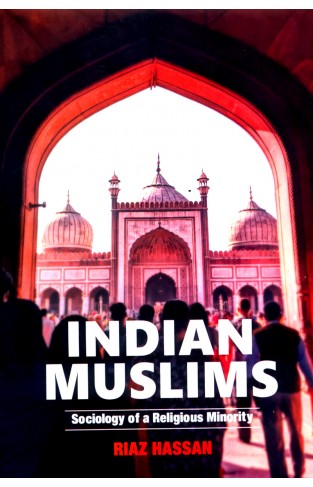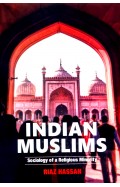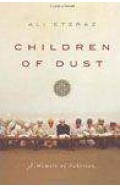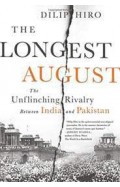Indian Muslims
By: Riaz Hassan
-
Rs 1,995.00
Due to constant currency fluctuation, prices are subject to change with or without notice.
India is projected to have the world's largest Muslim population surpassing Pakistan and Indonesia by the middle of this century. This book makes a compelling case that Indian Muslims have not been equal beneficiaries of India's economic growth. Their status now is not very different from that of the lowest-ranked Dalits in Indian society. The evidence shows that socio-economic status of the Indian Muslim community has been slipping for a long time. The book challenges the dominant image among majority Hindus that Muslims are innately prone to religious fundamentalism, militancy and extremism. Using information from official reports and data from a survey of Muslims from ten Indian states, the book explores the architecture of Muslim religiosity, the status of Muslim women, social and political attitudes and their socio-economic well-being. The evidence defies the myth of religious orthodoxy and shows that Indian Muslims are less orthodox and patriarchal than their co-religionists from Muslim majority countries. Theoretically informed and empirically grounded analysis and discussion in the book offers fresh insights into the social, political and economic conditions of Indian Muslims in the current context of rising Islamophobia and anti-Muslim rhetoric in India. This is undermining the constitutionally mandated promise of equality of citizenship and opportunity to all Indian citizens including minorities.
India is projected to have the world's largest Muslim population surpassing Pakistan and Indonesia by the middle of this century. This book makes a compelling case that Indian Muslims have not been equal beneficiaries of India's economic growth. Their status now is not very different from that of the lowest-ranked Dalits in Indian society. The evidence shows that socio-economic status of the Indian Muslim community has been slipping for a long time. The book challenges the dominant image among majority Hindus that Muslims are innately prone to religious fundamentalism, militancy and extremism. Using information from official reports and data from a survey of Muslims from ten Indian states, the book explores the architecture of Muslim religiosity, the status of Muslim women, social and political attitudes and their socio-economic well-being. The evidence defies the myth of religious orthodoxy and shows that Indian Muslims are less orthodox and patriarchal than their co-religionists from Muslim majority countries. Theoretically informed and empirically grounded analysis and discussion in the book offers fresh insights into the social, political and economic conditions of Indian Muslims in the current context of rising Islamophobia and anti-Muslim rhetoric in India. This is undermining the constitutionally mandated promise of equality of citizenship and opportunity to all Indian citizens including minorities.
Zubin Mehta: A Musical Journey (An Authorized Biography)
By: VOID - Bakhtiar K. Dadabhoy
Rs 840.00 Rs 1,050.00 Ex Tax :Rs 840.00
The Longest August The Unflinching Rivalry Between India and Pakistan
By: Dilip Hiro
Rs 1,196.00 Rs 1,495.00 Ex Tax :Rs 1,196.00
The Upstairs Wife: An Intimate History of Pakistan
By: Rafia Zakaria
Rs 5,295.00 Ex Tax :Rs 5,295.00
The Origins of Political Order From Prehuman Times to the French RevolutioN
By: Francis Fukuyama
Rs 4,495.00 Ex Tax :Rs 4,495.00
Manning Up: How the Rise of Women Has Turned Men into Boys
By: Kay Hymowitz
Rs 995.00 Ex Tax :Rs 995.00
The Obama Syndrome: Surrender At Home War Abroad
By: Tariq Ali
Rs 1,036.00 Rs 1,295.00 Ex Tax :Rs 1,036.00
The Quest For Meaning: Developing A Philosophy Of Pluralism
By: Tariq Ramadan
Rs 1,116.00 Rs 1,395.00 Ex Tax :Rs 1,116.00
The Pakistan US Conundrum Jihadists The Military And The People The Struggle For Control
By: Yunas Samad
Rs 1,116.00 Rs 1,395.00 Ex Tax :Rs 1,116.00
An Enemy We Created: The Myth Of The Taliban Al Qaeda Merger In Afghanistan 19702010
By: Alex Strick van Linschoten
Rs 5,250.00 Ex Tax :Rs 5,250.00
WikiLeaks: Inside Julian Assanges War on Secrecy
By: David Leigh & Luke Harding
Rs 850.00 Ex Tax :Rs 850.00
The Longest August The Unflinching Rivalry Between India and Pakistan
By: Dilip Hiro
Rs 1,196.00 Rs 1,495.00 Ex Tax :Rs 1,196.00
The Upstairs Wife: An Intimate History of Pakistan
By: Rafia Zakaria
Rs 5,295.00 Ex Tax :Rs 5,295.00
No recently viewed books available at the moment.
Zubin Mehta: A Musical Journey (An Authorized Biography)
By: VOID - Bakhtiar K. Dadabhoy
Rs 840.00 Rs 1,050.00 Ex Tax :Rs 840.00
The Longest August The Unflinching Rivalry Between India and Pakistan
By: Dilip Hiro
Rs 1,196.00 Rs 1,495.00 Ex Tax :Rs 1,196.00
The Upstairs Wife: An Intimate History of Pakistan
By: Rafia Zakaria
Rs 5,295.00 Ex Tax :Rs 5,295.00















-120x187.jpg?q6)










-120x187.jpg?q6)



-120x187.jpg?q6)



